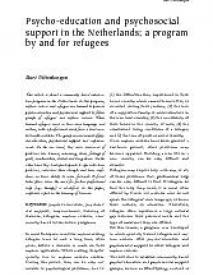Psycho-education and psychosocial support in the Netherlands; a program by and for refugees
This article is about a community based intervention program in the Netherlands. In this program,, asylum seekers and refugees are trained to provide psycho-education and psychosocial support to fellow groups of refugees and asylum seekers. These trained refugees work in their own language and culture, with a professional coach from a local mental health institute. The group courses consist of psycho-education, psychosocial support and empowerment. On the one hand, they raise awareness of problems like trauma, mourning, stress, feelings of guilt, acculturation, alcohol and drug abuse. On the other hand they teach participants to cope with these problems, rediscover their strength and have confidence in their ability to move forward,. Referral takes place when the need for further professional help (e.g. therapy) is identified. In this paper, emphasis is put on the training of trainers. Keywords: psycho-education, psychosocial support, empowerment, training of trainers, refugees, asylum seekers, community-based intervention programs
Geachte bezoeker,
De informatie die u nu opvraagt, kan door psychotraumanet niet aan u worden getoond. Dit kan verschillende redenen hebben,
waarvan (bescherming van het) auteursrecht de meeste voorkomende is. Wanneer het mogelijk is om u door te verwijzen naar de bron
van deze informatie, dan ziet u hier onder een link naar die plek.
Als er geen link staat, kunt u contact opnemen met de bibliotheek,
die u verder op weg kan helpen.
Met vriendelijke groet,
Het psychotraumanet-team.
Reference:
Bart Uitterhaegen | 2005
In: Intervention: the international journal of mental health, psychosocial work and counselling in areas of armed conflict, ISSN 1571-8883 | 3 | 2 | 141-147
http://www.interventionjournal.com/sites/default/files/141_147_Bart.pdf
In: Intervention: the international journal of mental health, psychosocial work and counselling in areas of armed conflict, ISSN 1571-8883 | 3 | 2 | 141-147
http://www.interventionjournal.com/sites/default/files/141_147_Bart.pdf


